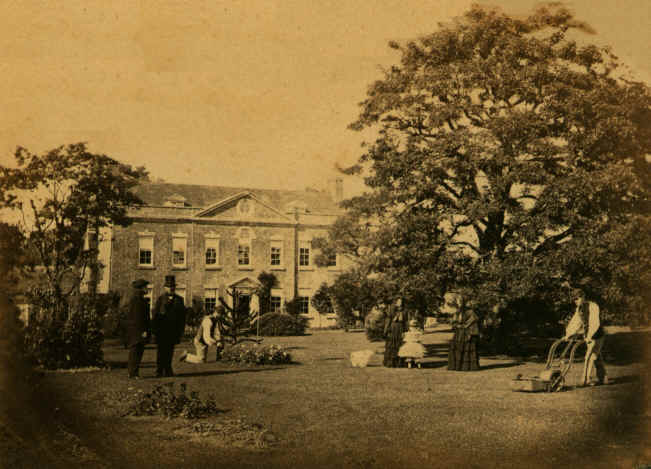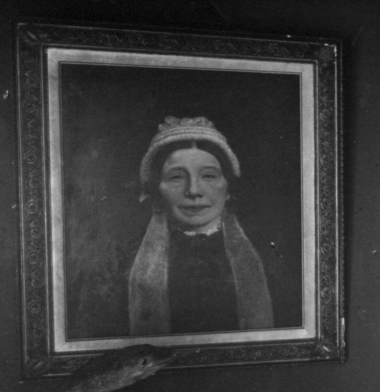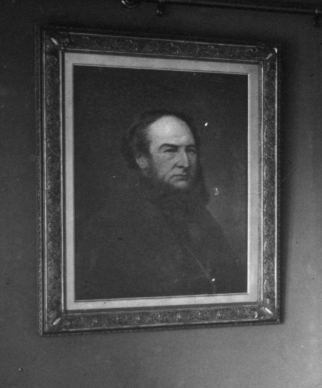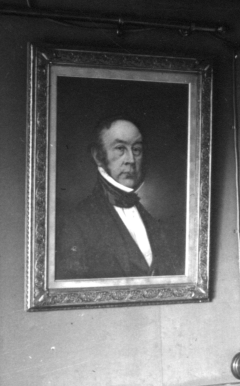
Charles and James Clark
The best known tenants of Finmere House are the brothers Dr Charles and Dr James Clark, who took up residence after 1830. James, an Edinburgh-trained doctor, by no means turned his back on the village and devoted himself to his rented house and to village affairs. He cared for and enhanced the gardens of Finmere House and set to work determinedly to improve sanitary conditions for the villagers. Unhealthy and evil-smelling cesspools at the doors of the cottages were removed, and James oversaw the covering of the open brook that ran along Fulwell Road. He shared the Victorian passion for mechanical devices and, with the aid of the village carpenter William Bayliss, constructed a windmill for pumping water and other ingenious contrivances in the grounds of Finmere House. In 1858–59, he was responsible for the repair and improvement of the clock in St Michael’s, adding a minute hand and new escapement. Apart from the aid of a £7 grant voted by the Vestry, he met the costs of its removal and replacement in the south wall of the tower from his own pocket.

The Clarke family poses outside Finmere House
James Clark died in 1869, his brother Charles four years later, and both are buried in the crypt, in recent years badly overgrown, at Barton Hartshorn. Charles’s widow Elizabeth then briefly occupied the house before the Symes-Thompson family purchased the freehold in 1898. Elizabeth 'Nun' Sikes, daughter of Charles and Elizabeth is buried in Finmere churchyard.
 |
 |
 |
| Elizabeth | James | Charles |
Notes
Charles Clarke was born at Chetwode Priory, Buckinghamshire in 1808, son of Elizabeth of Notley. He graduated from Edinburgh University in 1829. His dissertation was on tetanus. Medical directories show that he was at Finmere from 1848, perhaps earlier. No details are given in the Directories as Charles does not return their “Annual Circular;” he appears only in the Supplementary List. In 1876-1879, he is recorded as “retired.” From 1880, Finmere is not mentioned in the Directory.
James Clark was also born at Chetwode Priory, Buckinghamshire in 1800, son of Elizabeth of Notley. I cannot find a James Clark(e) in the lists of Edinburgh Alumni. There are some records of James Clark(e)s practicing around that date but none seem to be our James. He may have died on 13 November 1873.
Both James and Charles are buried in the family crypt at Barton Hartshorne.
James is not the James that advised Queen Victoria to use anaesthesia during childbirth. Or for that matter, the James Clark who was a close confidant of Florence Nightingale during her sister’s insanity. That was former naval surgeon, Sir James Clarke who graduated from Edinburgh in 1821.
This information from the Probate Calendars was provided by Andrew James
1874, 22nd of June.
Administration (with the Will) of the effects of James Clark late of Finmere House in the County of Oxfordshire, M.D., a Bachelor, who died 13th of November 1873 at Finmere, was granted at the Principal Registry to Elizabeth Clark Spinster the Sister the Universal Legatee for life Charles Clark M.D. the Brother the Contingent Universal Legatee for life and Edwin Clark of Twyford in the county of Buckingham Gentleman the Nephew and one of the persons entitled to the undisposed of Residue.
Effects under £14,000.
1879, 5th of February.
The Will of Charles Clark of Finmere House, Finmere in the County of Oxfordshire, Esq. M.D. who died 11th of November 1878 at Finmere House, was proved at Oxford by Eliza Clark of Finmere House Widow the Relict and James Jones Salt of Calthorpe-road Edgbaston in the County of Warwick Lamp Manufacturer the Executors.
Personal effects under £14,000.
Jackson’s Oxford Journal 8 January 1853. Suicide of Mr George Carpenter, Tingewick. Dr Clark made the examination. Verdict “temporary insanity.”
Jackson’s Oxford Journal 8 October 1853. At the Red Lion, Tingewick, on the 28th alt. an inquest on the body of John Hunt a labourer, aged 53 years. Deceased was at his daily work on Monday 26th and retired about eight in the evening, apparently in his usual health. About an hour and a half afterwards, he was found in his bed a corpse. Dr Clark’s opinion was that the deceased had died from a sposmadic affection of the heart. Verdict accordingly.